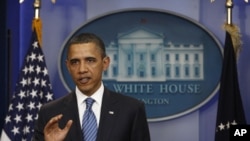In a speech on Wednesday, President Barack Obama will lay out what the White House calls his vision for dealing with the crushing debt and deficit problems threatening the nation's economic recovery and prospects for future growth.
Leading up to Wednesday's speech, and particularly since Republican victories in last November's mid-term congressional elections altered the balance of power in Congress, Mr. Obama and Republicans have battled over taxes and government spending.
There have been major compromises, such as last December's agreement to temporarily extend Bush-era tax cuts, and the budget deal last week that averted a government shutdown.
Mr. Obama has frequently warned of what he called tougher negotiations ahead on getting control of government deficit spending and tackling the national debt, which exceeds $14 trillion.
But even when he presented his $3.7 trillion budget for the 2012 fiscal year that begins in October, with a goal of reducing the deficit by $1.1 trillion over 10 years, the president avoided outlining a comprehensive plan for deficit and debt reduction.
He also did not fully embrace findings of his own bipartisan fiscal commission that recommended some $4 trillion in spending cuts, including the need to address huge costs of so-called entitlement programs, such as Medicare and Social Security.
This will change on Wednesday in Mr. Obama's speech at George Washington University, as the president presents what his spokesman, Jay Carney, calls a "vision" for long-term deficit and debt reduction.
"He has talked very clearly about the need to get this done through a conversation where everyone sits at the table and discusses a balanced way to address our long-term deficit and debt, and he will provide his vision tomorrow, and looks forward to working with leaders of Congress going forward from there," Carney said.
Carney carefully avoided getting into specifics, but he stressed that Mr. Obama's speech has been long in preparation and results from a deliberate approach, something the president is known for.
Information that has emerged from administration officials points to Mr. Obama wading into the politically risky territory of discussing further cost savings in costly government benefit programs for the elderly and poor, Medicare and Medicaid.
On the question of Social Security, the president is likely to reiterate his view that though this large program is not a major contributor to deficit problems in the near or medium term, steps should be taken to strengthen it.
He is also expected to pledge intensified efforts to find additional savings from other programs and increase government revenues by raising taxes for wealthier Americans.
The White House says Mr. Obama's speech is not a response to a Republican plan that proposes more than $5 trillion in cuts over the next decade. Press Secretary Carney said the president sees the plan as fundamentally unfair. "He believes that the plan itself fails the test of balance and that balance is essential," Carney said.
On the eve of Mr. Obama's speech, Republicans continued to hammer away at the president, asserting that he has not demonstrated leadership when it comes to spending and deficit issues.
Senate Minority Leader Mitch McConnell and others also continued to link the issue of raising the government's debt ceiling, something the White House insists should not be subject to political gamesmanship, to further spending concessions by Mr. Obama.
"That means no window-dressing, no blue smoke and mirrors, something real, something measurable, that clearly will begin to reduce our debt," McConnel said.
Senate Majority Leader Harry Reid had this response when asked about the kind of specifics the president may provide in his speech.
"I don't know how specific we need him to be. I think we need an outline as to what he thinks needs to be done to get us back to a point where we are retiring the debt during the Clinton years," Reid said.
On the eve of President Obama's speech, House of Representatives Speaker Republican John Boehner said any proposal President Obama makes in his speech to raise taxes would be "unacceptable . . . and a nonstarter."
The president has invited Boehner and other congressional leaders to the White House early Wednesday to discuss his fiscal policy vision before he presents it in his speech later in the day.
Obama to Present Vision for Tackling Debt and Deficits




